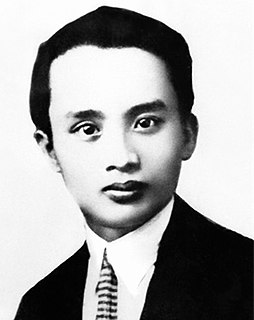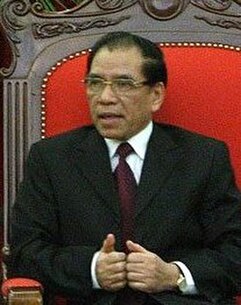 W
WThe General Secretary of the Central Committee of the Communist Party of Vietnam, known as First Secretary from 1951 to 1976, is the highest office within the Communist Party of Vietnam and typically the supreme leader of Vietnam. The General Secretaryship was the second-highest office within the party when Hồ Chí Minh was Chairman, a post which existed from 1951 to 1969. The general secretary is also the Secretary of the Central Military Commission, the leading Party organ on military affairs. For a period in its history, the position of general secretary has been synonymous with the paramount leader of Vietnam. The current general secretary is Nguyễn Phú Trọng, and he is ranked first in the Politburo.
 W
WĐỗ Mười was a Vietnamese communist politician. He rose in the party hierarchy in the late 1940s, became Chairman of the Council of Ministers in 1988 and was elected General Secretary of the Central Committee of the Communist Party of Vietnam (CPV) at the 7th Congress in 1991. He continued his predecessor's policy of ruling through a collective leadership and Nguyễn Văn Linh's policy of economic reform. He was elected for two terms as General Secretary, but left office in 1997 at the 3rd plenum of the 8th Central Committee during his second term.
 W
WHà Huy Tập was a Vietnamese revolutionary and the third General Secretary of the Central Committee of the Communist Party of Vietnam (CPV).
 W
WHồ Chí Minh, born Nguyễn Sinh Cung, also known as Nguyễn Tất Thành, Nguyễn Ái Quốc, Bác Hồ, or simply Bác, was a Vietnamese revolutionary and politician. He served as Prime Minister of North Vietnam from 1945 to 1955 and President from 1945 until his death in 1969. Ideologically a Marxist–Leninist, he served as Chairman and First Secretary of the Workers' Party of Vietnam.
 W
WLê Duẩn was a Vietnamese communist politician. He rose in the party hierarchy in the late 1950s and became General Secretary of the Central Committee of the Communist Party of Vietnam (VCP) at the 3rd National Congress in 1960. He continued Hồ Chí Minh's policy of ruling through collective leadership. From the mid-1960s until his own death in 1986, he was the top decision-maker in Vietnam.
 W
WLê Hồng Phong (1902–1942) was the second leader of the Communist Party of Vietnam (CPV); he led the party through the office of General Secretary of the Overseas Executive Committee of the Communist Party of Vietnam. The Overseas Executive Committee was the only body of the CPV left intact after increased repression by the French authorities in Indochina.
 W
WLê Khả Phiêu was a Vietnamese politician who served as General Secretary of the Communist Party of Vietnam from December 1997 to April 2001. Lê Khả Phiêu served in the Vietnam People's Army during the First and Second Indochina Wars, join in the Cambodian war, and was Head of the General Political Department of the Vietnam People's Army.
 W
WNguyễn Phú Trọng is a Vietnamese politician who has been the General Secretary of the Communist Party of Vietnam, the highest position in Vietnam since 2011. In addition, Trọng served as president of Vietnam from 2018 to 2021. As general secretary, Trọng heads the party's secretariat and is the Secretary of the Central Military Commission in addition to being the de facto head of the politburo, the highest decision-making body in Vietnam, which currently makes him the most powerful person in Vietnam.
 W
WNguyễn Văn Linh was a Vietnamese revolutionary and politician. Nguyễn Văn Linh was the general secretary of the Communist Party of Vietnam from 1986 to 1991 and a political leader of the Vietcong during the Vietnam War. During his time in office, Linh was a strong advocate of "Đổi Mới" (renovation), an economic plan whose aim is to turn Vietnam economy to a socialist-oriented market economy. As such, Linh was often touted as the "Vietnamese Gorbachev" after the Soviet leader, who introduced Perestroika.
 W
WNguyễn Văn Cừ was a Vietnamese revolutionary, a descendant of Nguyễn Trãi. He served as the fourth General Secretary of the Central Committee of the Communist Party of Vietnam (CPV) 30 March 1938 – 9 November 1940.
 W
WNông Đức Mạnh is a Vietnamese politician who served as General Secretary of the Communist Party of Vietnam, the most powerful position in the Socialist Republic of Vietnam, from 22 April 2001 to 19 January 2011. His parents were Tày peasants. Nông Đức Mạnh was born in Cường Lợi, Na Rì District, Bắc Kạn Province. His own son is Nông Quốc Tuấn, party secretary for Bắc Giang Province.
 W
WTrần Phú was a Vietnamese revolutionary and the first general secretary of the Indochinese Communist Party, later renamed the Communist Party of Vietnam.
 W
WTrường Chinh was a Vietnamese communist political leader and theoretician. He was one of the key figures of Vietnamese politics. He played a major role in the anti-French colonialism movement and finally after decades of protracted war in Vietnam, the Vietnamese defeated the colonial power. He was the think-tank of the Communist Party who determined the direction of the communist movement, particularly in the anti-French colonialism movement. After the declaration of independence in September 1945, Trường Chinh played an important role in shaping the politics of the Democratic Republic of Vietnam (DRV) and creating the socialist structure of the new Vietnam.